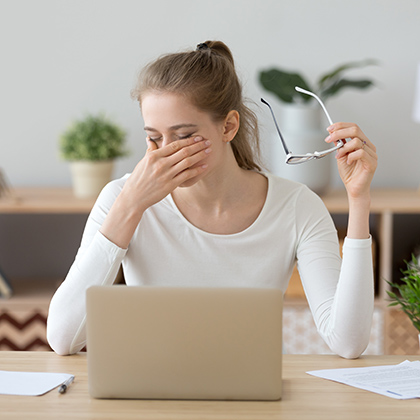
Blue light has been a much-debated topic as of late. Products such as blue light glasses and other related tools to curb its impact have come under the microscope too. In this piece, we will explore whether blue light glasses are enough to protect your eyes. So first things first, what is blue light anyway?
What is blue light?
Produced naturally by the sun and artificially by electronic light sources, blue light is part of the visible light spectrum, which ranges from the shortest wavelength and highest energy rays (blue light) through green light, yellow light and orange light to the longest wavelength and lowest energy rays (red light).
Combined, all of these visible light rays produce what we know of as white light, or sunlight. While we’re exposed to far greater levels of blue light from the sun than electronic sources, the reason it’s currently the subject of much debate is that we’re exposed to these indoor sources of blue light much more frequently these days than we were in the past.
Blue light & eye health
Blue light is also of concern to eye health specialists because most of it passes through the cornea, the transparent front part of the eye, and the lens to reach the light-sensitive part of the back of the eye called the retina. In contrast, far lower levels of ultraviolet or UV light (classed as invisible light) reach the retina, because the cornea and the lens are a lot more effective at blocking UVi.

However, any evidence produced to date that blue light may cause damage to the human retina is weak. The only studies to date that have discovered a possible link between blue light and retinal damage have been carried out on lab cultures or on animalsii, with neither method considered particularly relevant for human health.
This explains why experts from respected organisations such as the RNIB, the Association of Ophthalmologists, the College of Optometrists and the American Academy of Opthalmology believe that as of yet, there’s no reliable, peer-reviewed research to suggest blue light is connected to eye damageiii – though studies are still ongoing in this area.
Blue light lenses: to wear or not to wear?
Despite this lack of evidence, a number of products have become available in recent years that claim to protect against blue light damage, one of which is glasses with special blue-light-blocking lenses (also called blue-blocking glasses or blue-light glasses).
These lenses are designed to reduce the level of blue light that reaches the eyes by using a special coating that reflects and absorbs short-wavelength light. Some lenses also combine this coating with an anti-reflective coating, which helps to reduce glare and increase contrast.
Manufacturers of blue-light lenses have made a number of claims for their products, including that they help protect the retina and reduce computer-related eye strain and discomfortiv. But experts believe the argument for blue light filters is purely theoretical and based on in vitro (test tube) or laboratory-based experiments, rather than on human clinical studiesv. What’s more, according to the Association of Ophthalmologists, blue light filter coatings typically only block around 20 per cent of visible blue lightvi.
Indeed, blue light glasses were at the centre of a famous controversy in 2017, when Boots Opticians was given a £40,000 fine by the UK’s optical regulator, the General Optical Council, for using a ‘misleading’ advertisement about the company’s blue-light lens product.
The Advertising Standards Authority (ASA) had previously received complaints about the ad’s claims that blue light from LED TVs, smartphones and energy-saving light bulbs caused damage to retinal cells over time, and that the Boots lenses protected against blue light from these sources.
The ASA subsequently ruled that these claims were misleading and unsubstantiated, stating that ‘only full trials conducted on humans were sufficient, potentially, to support the claims’vii. Yet a later investigation by the BBC’s Watchdog programme found that some Boots opticians practices had continued to make misleading claims about the lenses, including through leaflets the company distributed in its stores, which led to the General Optical Council’s fine.
Blue lenses & sleep
Blue light and sleep is a hot topic in this space. There may not be any strong evidence that blue light damages vision at the moment, but there are more reliable data to suggest evening blue light exposure has a negative effect on sleep by blocking the brain’s production of the sleep-inducing hormone melatoninviii.
There is also some evidence that wearing blue-light glasses in the evening may help with light-induced melatonin suppressionix.
Indeed, according to Trevor Warburton, clinical adviser at the Association of Ophthalmologists, blue light glasses may be suitable in certain situations. In a May 2017 issue of Optometry Today, while emphasising that current evidence doesn’t support any claims that blue lenses prevent eye disease, Warburton added that coating designed for filtering visible blue light may improve visual comfort for some people and help reduce the impact visible blue light may have on sleepx.
On the other hand, a 2017 scientific review considering the potential benefits and harms of blue-light lenses found that while there’s currently a lack of high-quality clinical evidence to support the use of blue-light glasses for protecting against eye disease, there’s also a lack of evidence that blue-light lenses help improve sleep qualityxi.
However, it’s true that we don’t yet know as much about blue light as other types of light – UV light, for example – and research into blue light, how it may affect human vision and the best ways to protect against it is still at a relatively early stage. With experts calling for further work to be carried out in this area, there could well be more helpful discoveries to come.
To find out more about other ways safeguarding your eyesight against any possible effects of blue light exposure, read How to Protect Your Eyes Against the Effects of Blue Light.
If you’re interested in lots of other ways of keeping your vision healthy, why not take a look around the rest of our Vision Health Hub?
References:
-
RNIB. 2017. Can blue light cause AMD? Available online: https://www.rnib.org.uk/nb-online/blue-light-amd Date accessed: 25/01/2019.
-
Davies, S., et al. Photocytotoxicity of lipofuscin in human retinal pigment epithelial cells. Free Radic Biol Med. 2001 Jul 15. ;31(2):256-65. Available online: https://www.ncbi.nlm.nih.gov/pubmed/11440838?dopt=Abstract
Sparrow, J.R., Miller, A.S., Zhou, J. Blue light-absorbing intraocular lens and retinal pigment epithelium protection in vitro. J Cataract Refract Surg. 2004 Apr. ;30(4):873-8.
Seko, Y., Pang, J., Tokoro, T., Ichinose, S., Mochizuki, M. Blue light-induced apoptosis in cultured retinal pigment epithelium cells of the rat. Graefes Arch Clin Exp Ophthalmol. 2001 Jan. ;239(1):47-52. Available online: hhttps://www.ncbi.nlm.nih.gov/pubmed/11271461
Ham, W.T., Ruffolo, J.J., Mueller, H.A. & Guerry, D.The nature of retinal radiation damage: dependence on wavelength, power level and exposure time.. Vision Research, Volume 20, Issue 12. 1980. Pages 1105-1111. Available online: https://www.sciencedirect.com/science/article/pii/0042698980900474 -
RNIB. 2017. Can blue light cause AMD? Available online: https://www.rnib.org.uk/nb-online/blue-light-amd Date accessed: 25/01/2019.
Association of Optometrists. 2017. Visible Blue Light. Available online: https://www.aop.org.uk/advice-and-support/policy/position-statements/visible-blue-light Date accessed: 25/01/2019.
Look After Your Eyes. (2016). Blue Lens Filters, Watchdog. Available online: https://lookafteryoureyes.org/about-us/headlines/watchdog-episode-2-series-37-bbc-9-august-2016/, https://www.aao.org/eye-health/tips-prevention/should-you-be-worried-about-blue-light Date accessed: 25/01/2019. -
Blue Light Exposed Available online: http://www.bluelightexposed.com Date accessed: 25/01/2019.
-
Downie, L.E. Blue-light filtering ophthalmic lenses: to prescribe, or not to prescribe?. OPO Vol 37, Issue 6, 640 - 643. Nov 2017. Available online: https://onlinelibrary.wiley.com/doi/full/10.1111/opo.12414
-
Association of Optometrists. Visible Blue Light. Aug 2000. Available online: https://www.aop.org.uk/advice-and-support/policy/position-statements/visible-blue-light
-
Available online: https://www.asa.org.uk/rulings/boots-professional-services-ltd-a15-293200.html
-
Chang, A.M., et al. Evening use of light-emitting eReaders negatively affects sleep, circadian timing, and next-morning alertness. PNAS. January 27, 2015. ;112 (4) 1232-1237. Available online: https://www.pnas.org/content/112/4/1232
Holzman, D.C. What’s in a Color? The Unique Human Health Effects of Blue Light. Environ Health Perspect. 2010 Jan. ;118(1): A22–A27. Available online: https://www.ncbi.nlm.nih.gov/pmc/articles/PMC2831986 -
Sasseville, A., Paquet, N., Sevigny, J., Hebert, M. Blue blocker glasses impede the capacity of bright light to suppress melatonin production. Pineal Res. Vol 41, Issue 1, 73-38. Aug 2016. Available online: https://onlinelibrary.wiley.com/doi/full/10.1111/j.1600-079X.2006.00332.x
Burkhard, K., Phelps, J.R. Amber lenses to block blue light and improve sleep: a randomized trial. Chronobiol Int. 2009 Dec. ;26(8):1602-12. Available online: https://www.ncbi.nlm.nih.gov/pubmed/20030543
Rahman,, et al. Effects of Filtering Visual Short Wavelengths During Nocturnal Shiftwork on Sleep and Performance. Chronobiol Int. 2013 Oct. ;30(8): 951–962. Available online: https://www.ncbi.nlm.nih.gov/pmc/articles/PMC3786545 -
Available online: https://www.aop.org.uk/ot/industry/high-street/2017/05/26/boots-opticians-fined-40000-over-misleading-blue-light-advertising Date Accessed: 23/01/2019.
-
Lawrenson, J.G., Hull, C.C., Downie, L.E. The effect of blue-light blocking spectacle lenses on visual performance, macular health and the sleep wake cycle: a systematic review of the literature. OPO Vol 37 Issue 6, 644 - 654. November 2017. Available online: https://onlinelibrary.wiley.com/doi/10.1111/opo.12406
Related Posts?
Disclaimer: The information presented by Nature's Best is for informational purposes only. It is based on scientific studies (human, animal, or in vitro), clinical experience, or traditional usage as cited in each article. The results reported may not necessarily occur in all individuals. Self-treatment is not recommended for life-threatening conditions that require medical treatment under a doctor's care. For many of the conditions discussed, treatment with prescription or over the counter medication is also available. Consult your doctor, practitioner, and/or pharmacist for any health problem and before using any supplements or before making any changes in prescribed medications.

Christine
Christine Morgan has been a freelance health and wellbeing journalist for almost 20 years, having written for numerous publications including the Daily Mirror, S Magazine, Top Sante, Healthy, Woman & Home, Zest, Allergy, Healthy Times and Pregnancy & Birth; she has also edited several titles such as Women’ Health, Shine’s Real Health & Beauty and All About Health.
View More



